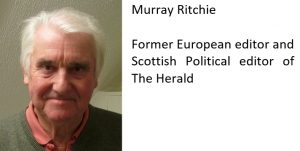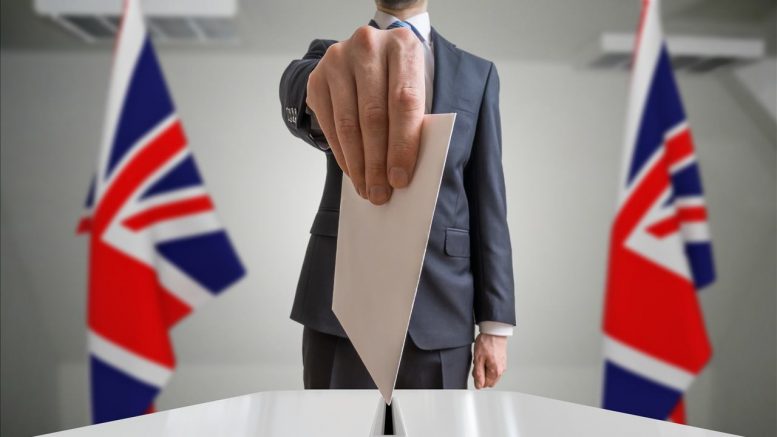A growing number of people want Brexit stopped before Britain does itself irreparable economic and international damage, writes Murray Ritchie.
When the British diplomat – and true pillar of the Establishment – who wrote Article 50 says Brexit will lead to disaster and must be stopped, you suspect a political earthquake might be coming.
The latest call to halt Brexit to avert catastrophe comes from Lord Kerr of Kinlochard, formerly Sir John Kerr, who was the top Foreign Office mandarin before becoming British Ambassador to Washington. Later, he became our leading diplomat when he was UK permanent representative in the European Union.
There is almost no-one who can match his knowledge of the EU’s workings and Britain’s troubled history in dealing with Brussels. He wrote the EU’s so-called constitution which begat the Lisbon Treaty and he now sits in the Lords where many – probably a comfortable majority – regard Brexit as a dirty word.
Yet Lord Kerr has just put his name to a call, started in Scotland, for Brexit to be stopped before – as he sees it – Britain does itself irreparable harm. Already the UK is weakened by diminished influence and has seen its international reputation seriously damaged, he says.
Scores of other influential Scots who agree are his fellow signatories to a letter published on Tuesday in The Herald. They include former Nato Secretary General Lord Robertson, ex-Liberal Democrat leader Sir Menzies Campbell, former Scottish first minister Henry McLeish, assorted politicians from all parties, academics, historians and trade unionists.
We need to think again about Brexit, to have a UK-wide debate about calling a halt to the process and changing our minds
This coming together of determined Remainers appears to be the start of a broad and formidable coalition for abandoning Brexit – and they have widespread support from the Scottish government and the UK LibDems, not to mention a probable majority of voters in London, Scotland and Northern Ireland.
It could yet be that Brexit is indeed scuppered by this rapidly mobilising force. The movement includes the devolved nations of the United Kingdom and the Remain majority of Londoners who are being ignored by Westminster. When they take their fight to the House of Commons, who can predict what will happen?
“In a democracy it is always possible to think again and to choose a different direction,” said Lord Kerr and his co-signatories. “We need to think again about Brexit, to have a UK-wide debate about calling a halt to the process and changing our minds.”
There are precedents, of course. Denmark rejected the Maastricht Treaty by a small majority and later approved it. The Irish rejected the Lisbon Treaty and had a change of mind in a second referendum.
Since Leave’s victory the UK government has said the devolved administrations will be consulted (but not involved) in the Brexit process – a policy which has poisoned the atmosphere and appears to be unraveling.
The Lords have suggested Scotland should be given special Brexit treatment by increasing Holyrood’s powers over immigration to cater for the country’s EU labour needs.
While rejecting the idea of Scottish continued membership of the single market, the House of Lords European Union Committee acknowledged in a report published on Wednesday that Scotland is a case for special treatment.
They talk of “particular circumstances” in Scotland where the Remain vote was the largest in the UK at 62 per cent and conclude: “In the event that the UK Government does not secure a UK-wide agreement that adequately reflects Scotland’s specific needs, there is a strong political and economic case for making differentiated arrangements for Scotland”.
Wales and Scotland are now taking the UK government to task by formally invoking the Treasury’s disputes procedure for the first time through the joint ministerial committee
For Prime Minister Theresa May the Brexit fallout over the devolved nations just gets more difficult. When the Tory/Democratic Unionist Party (DUP) deal was concluded at the cost of another £1bn for Northern Ireland, the Welsh and Scots were outraged.
They felt the money – much of which will be spent on health and education – should have been shared under Barnett formula rules. Wales wants £1.7bn and Scotland almost £3bn. England could have a claim, too.
Wales and Scotland are now taking the UK government to task by formally invoking the Treasury’s disputes procedure for the first time through the joint ministerial committee.
Increasingly, it seems, the Westminster claim that it can win a Brexit deal to unite the ‘Disunited Kingdom’ is becoming laughable.
Consider: Scotland wants back into the EU or at least to retain membership of the single market. Wales voted Leave but now believes Westminster will steal back its devolved powers (a suspicion shared with Scotland). The Northern Irish want to remain but their own DUP don’t, and now appear to be acting against a majority of their own people.
Meanwhile, the UK is being treated with increasing derision in Brussels as it struggles to come up with a coherent negotiating strategy. Is it any wonder the forces for reversing Brexit or at least sending it to a second referendum appear to be getting their act together?





